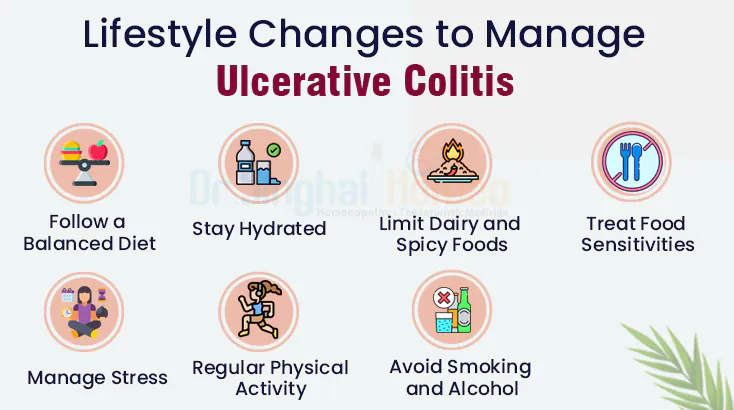
Ulcerative colitis (UC) is a chronic inflammatory bowel disease (IBD) that primarily affects the colon and rectum, leading to symptoms such as abdominal pain, diarrhea, and rectal bleeding. While there is no definitive cure for UC, various treatment options can help manage symptoms, prevent flare-ups, and improve overall quality of life. This blog explores the different ulcerative colitis treatment options, including medications, therapies, and lifestyle changes that can help manage the disease effectively.
Understanding Ulcerative Colitis Treatment
Managing ulcerative colitis requires a combination of medical intervention, dietary modifications, and lifestyle adjustments. The primary goal of treatment is to reduce inflammation, control symptoms, and achieve long-term remission.
Medications for Ulcerative Colitis
UC medications play a crucial role in controlling the disease by reducing inflammation, suppressing immune system activity, and alleviating symptoms. Treatment plans vary based on the severity and location of the inflammation.
1. Aminosalicylates (5-ASAs)
These anti-inflammatory drugs are often the first line of treatment for mild to moderate UC. They help reduce inflammation in the lining of the colon. Common 5-ASAs include:
- Mesalamine (Asacol, Lialda, Pentasa)
- Sulfasalazine (Azulfidine)
- Olsalazine (Dipentum)
Aminosalicylates can be taken orally or administered rectally, depending on the severity and location of inflammation. They work by targeting specific inflammatory pathways in the gut, reducing flare-ups and maintaining remission.
2. Corticosteroids
These are used for moderate to severe UC to reduce inflammation quickly. However, they are not suitable for long-term use due to side effects like osteoporosis, high blood pressure, and increased infection risk. Examples include:
- Prednisone
- Budesonide (Uceris, Entocort EC)
- Hydrocortisone
Corticosteroids are typically prescribed during severe flare-ups and are gradually tapered off to avoid withdrawal symptoms. Patients on long-term corticosteroid therapy should be monitored for bone density loss and other complications.
3. Immunomodulators
These drugs suppress the immune system to reduce inflammation. They are generally used when other treatments are ineffective.
- Azathioprine (Imuran)
- 6-Mercaptopurine (Purinethol, Purixan)
- Methotrexate
Immunomodulators take several weeks to months to show full effectiveness, making them more suitable for maintenance therapy rather than immediate symptom relief. They require regular blood monitoring to ensure safety and effectiveness.
4. Biologic Therapies
Biologics are advanced treatments targeting specific proteins involved in inflammation. They are often prescribed for moderate to severe cases of UC.
- Tumor Necrosis Factor (TNF) Inhibitors: Infliximab (Remicade), Adalimumab (Humira), Golimumab (Simponi)
- Integrin Inhibitors: Vedolizumab (Entyvio)
- IL-12 and IL-23 Inhibitors: Ustekinumab (Stelara)
These medications are administered via injection or infusion and can help patients achieve remission. However, they come with potential risks, such as increased susceptibility to infections and possible allergic reactions.
5. Janus Kinase (JAK) Inhibitors
JAK inhibitors help reduce inflammation by blocking specific enzymes in the immune response.
- Tofacitinib (Xeljanz)
This oral medication is a newer class of UC treatment that can be effective for patients who do not respond to biologic therapies. It works by interfering with the inflammatory signaling pathways that contribute to UC symptoms.
Ulcerative Colitis Therapy Options
In addition to medications, various therapies help in managing ulcerative colitis more effectively.
1. Fecal Microbiota Transplant (FMT)
FMT involves transferring healthy gut bacteria from a donor to restore the gut microbiome balance. This therapy is still under research but has shown promise in managing UC symptoms.
2. Probiotic Therapy
Probiotics help restore healthy gut bacteria, which can aid in reducing UC flare-ups. Some beneficial probiotic strains include Lactobacillus and Bifidobacterium.
3. Physical Therapy and Stress Management
Managing stress is vital in controlling UC symptoms. Techniques such as yoga, meditation, and cognitive behavioral therapy (CBT) can help reduce stress-related flare-ups.
4. Dietary Therapy
Diet plays a significant role in managing UC. A well-balanced diet can help reduce inflammation and improve digestion.
Lifestyle Changes for Managing Ulcerative Colitis
Along with medications and therapies, making lifestyle changes can help in long-term ulcerative colitis management.
1. Dietary Adjustments
- Foods to Eat:
- Cooked vegetables like carrots, squash, and zucchini
- Lean proteins like chicken, fish, and eggs
- Low-fiber fruits like bananas and melons
- Healthy fats such as olive oil and avocado
- Foods to Avoid:
- High-fiber foods like nuts, seeds, and raw vegetables
- Dairy products (if lactose intolerant)
- Spicy foods and caffeine
- Processed and high-fat foods
2. Regular Exercise
Low-impact exercises such as walking, swimming, and yoga can help reduce stress and promote digestive health.
3. Hydration
Drinking enough water is essential to avoid dehydration, especially during flare-ups when diarrhea is common.
4. Sleep and Rest
Getting enough sleep and managing fatigue can significantly impact the severity of UC symptoms.
When Surgery Becomes Necessary
In severe cases where medications and therapies fail to control symptoms, surgery may be required. The most common surgical options include:
- Proctocolectomy with Ileostomy – Removal of the colon and rectum with an external pouch.
- Ileoanal Pouch (J-Pouch) Surgery – Creation of an internal pouch to allow normal bowel movements.
Conclusion
Managing ulcerative colitis requires a combination of medications, therapies, and lifestyle modifications. While there is no cure, advancements in treatment options help patients achieve long-term remission and improved quality of life. Consulting a healthcare provider for a personalized treatment plan is crucial for effective UC management.
With ongoing research and advancements in treatment options, individuals living with ulcerative colitis have more resources than ever to manage their condition effectively. By adopting a proactive approach to treatment and lifestyle modifications, many patients can lead fulfilling lives with minimal UC-related disruptions.
